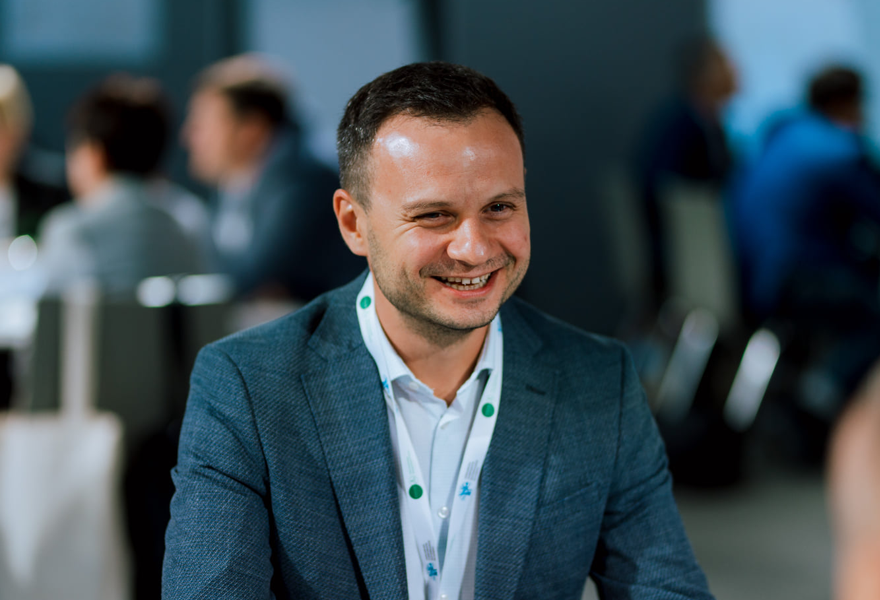
Since the beginning of the full-scale invasion and blocking of Ukrainian ports, the transition from the raw material export model to the production of high-value-added products is more relevant than ever. The round table “Oilseeds and their products – export opportunities of Ukraine”, organised by the KCCI Export Support Center, was devoted to this topic. Vyacheslav Chuk, the Commercial Director of Astarta, said how the company is engaged in deep processing and whether they plan to develop it.
Diversified business model and own processing as a way to quickly adapt during war or crisis
-The diversified business model helped Astarta to quickly adapt to work under martial law and ensure the continuity of production processes. Even with the decline in exports of grains and oilseeds due to the russian blockade of seaports, we managed to compensate for the company’s product range, two-thirds of which are processed and sold in Ukraine. These are milk, sugar and soybean products used for animal feeding.
We have maintained production volumes and sometimes even increased them. For example, in the 2021-22 marketing year, Astarta’s soybean processing plant processed 15% more soybeans than in the previous “pre-war” marketing year. And this, taking into account the instant destruction of logistics chains and the two-week forced shutdown of the enterprise at the very beginning of the war to ensure the safety of employees.
What to expect from the new processing season?
-We have all the prerequisites not to reduce production volumes in the future. Astarta has harvested early grains. We are already harvesting soybeans and sunflowers. The next step is corn and sugar beet digging.
We are already investing in the 2023 harvest, sowing winter rape, and planting winter wheat. By the way, the current situation with the blocking of raw material exports contributed to a change in crop rotation in Ukraine. Farmers have reduced corn, mainly exported, but increased soybeans, rapeseed and sunflower, which can be processed in Ukraine and shipped finished products: oil and meal. Therefore, the issue of developing deep domestic processing is even more acute than it was before the war.
In the new processing season, which has already started, we continue to adhere to ESG principles. Therefore, we continue to use biogas in the process of soybean processing. At such a price for gas in the EU countries, this will be an advantage for Ukrainian exports.
Will there be investments?
-Now, we invest only in essential projects to maintain the continuity of production processes. Large-scale investment projects have been suspended, but we are already returning to their consideration.
One such project is constructing a new technological line for the in-depth processing of soybeans. This innovative technology provides for the annual production of almost 100 thousand tons of soybean protein concentrate (SPC) from non-granulated soybean meal by extraction using an alcohol-water solution. Soy concentrate is an essential component for feed production for aquaculture and animals.
Another advantage Astarta has is the ability to export products grown and produced from European soybean seeds with guaranteed traceability of their origin. Remember how a few years ago, the world’s food companies demanded to stop trading in soybeans and its products grown in Brazil, on the site of deforestation and in violation of the principles of sustainable development? So, the fact that we grow non-GMO soybeans on the European continent without harming the ecosystem, even during the war, is our responsible attitude, a huge advantage, and we should use it.
In the future, it is possible to continue the processing chain and produce food soy proteins – concentrates and isolates for all food industry sectors.
Astarta is constantly exploring various options in the field of advanced processing of agricultural products and bioenergy. But for implementing significant investments during martial law, the state should provide a mechanism for ensuring military risks.
Prospects of Ukraine in the field of deep processing
-Ukraine started its work in the soybean processing segment as a net importer. We have become a net exporter in just eight years of work in this direction, including through the construction of new processing facilities. By the way, Astarta was one of those who started to implement such large pilot investment projects. Subsequently, other manufacturers joined.
Today Astarta exports more than 80% of products made from soybeans, particularly meal and soybean oil.
The next step is the development of its production and entry of Ukrainian processors to new markets.
Such steps will create even more added value, fill the state budget, increase export revenues to Ukraine, improve competitiveness and increase the ability of Ukrainians to survive the war and overcome the crisis. It is a challenge for Ukrainian businesses, but we will cope.
The source Latifundist.com
